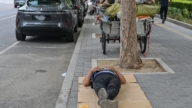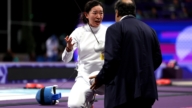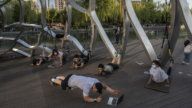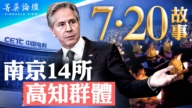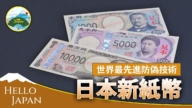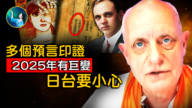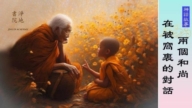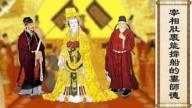【新唐人2014年07月02日訊】日前,香港首富李嘉誠在廣東「汕頭大學」出席畢業典禮時披露,近來有三件事一直困擾他,憂心使他「無心睡眠」。那麼到底是哪三件事情使這位85高齡的富翁煩憂、徹夜難眠?與他最近從大陸和香港頻頻拋售物產和撤資有甚麼聯繫?一起來看報導。
香港「長實集團」主席李嘉誠,6月27號上午出席了由他創立的「汕頭大學」畢業生畢業典禮,身兼校董會名譽主席的李嘉誠以「無心睡眠」為題發表致詞。
在致詞中他表示,85歲的他,對世間各種個人得失,早被風風雨雨沖淡,還有何憂心?
香港長實集團主席李嘉誠:「我憂心的是,在全球化和知識經濟的時代,不同的智商、能力和努力,令機會失衡成為新常態。我憂心,國家資源的侷限成未來發展的難題。」
李嘉誠還憂心,高福利社會人民的負擔和對貧富懸殊的憤怒,持續讓社會停滯和不安。
李嘉誠旗下的私人創投基金「維港投資」,6月23號起在中國六個城市進行巡迴推介,負責人周凱旋在推介會致辭中也曾介紹,李嘉誠擔心全球貧富懸殊持續,尤其在中國可能會惡化﹔還憂慮中國缺乏耕地及安全的飲用水﹔此外,他也擔心人與人之間欠缺互信,彼此沒有講真話。這三件事讓李嘉誠「睡不著」。
北京原首都師範大學教育科學學院副教授李元華:「他睡不著覺,一個是對於中國這個現實社會很多貧苦的人,看到了(他們)很痛苦,還有教育變成了一種產業,甚至是一種撈錢的工具。他可能從一個側面看到了問題的實質,就是今天中國這個社會共產邪黨統治幾十年來,把中國傳統道德破壞了,人與人之間沒有一個基本的信任。」
中國歷史學家、原「首都師範大學教育科學學院」副教授李元華表示,作為炎黃子孫的李嘉誠,他希望他能改善中國國民的生活,投入的教育能培養出真正造福社會的人才,但實際的情況使他很失望,又不能直說。
李元華:「因為他這麼些年來在中國社會,跟各級中國官員打交道,他知道這個中國整個這個社會是很腐敗的現狀,而且也看到了中共很多經濟上面臨的崩盤,包括他投入的房地產和許多的企業,他已經看到了危險性。」
連續16年雄踞華人首富寶座的李嘉誠,自去年8月以來,以低於市價35%以上的價格,拋售了廣州的「西城都薈」購物廣場、和上海的「東方匯經中心」、南京的「國際金融中心」大廈。李嘉誠兒子李澤楷今年也出售了北京「盈科中心」商場。李氏家族似乎在大陸不再擁有大規模的地產項目。
根據聯合國計劃開發署的統計資料顯示:目前中國佔人口總數20%的最貧困人口,佔收入或消費的份額只有4.7%,而佔總人口20%的最富裕人口,佔收入或消費的份額則高達50%。這表示,中國現在已是世界上收入差距最大的國家。
北京《國情內參》首席研究員鞏勝利:「如果按照聯合國人均每天1美元來計算,中國大概超過3億窮人,如果按照更嚴謹的貧富數據來統計,中國真正的貧困線,大概接近4億人口。」
北京《國情內參》期刊首席研究員鞏勝利認為,中共從產業到金融,和社會的壟斷,製造了貧富懸殊的生態困局。
鞏勝利:「政府不講信譽,政府的金融貨幣不講信譽,結果政府的國有企業不履行合同。中國整體的信譽、道德、社會、人文都出現了大倒退,倒退的結果,人沒有信譽。」
李元華表示,李嘉誠的擔憂及撤資,實際上是對整個中共統治的一個不信任或一個擔憂。
採訪編輯/易如 後製/舒燦
The Three Worries Of China’s Richest Tycoon Li Ka-shing
At the commencement ceremony of Shantou University
in China’s Guangdong Province, Hong Kong billionaire
Li Ka-shing said there are three things that have bothered him
to the extent that he cannot sleep well at night.
What are the three things that made this 85-year-old magnate
so worried and sleepless at night?
Is it related to his recent property sell-off in mainland China
and Hong Kong? Let’s see the following reports.
On the morning of June 27, Chairman of Hong Kong’s
Cheung Kong Holdings (CKH) Li Ka-shing, attended
the commencement ceremony of Shantou University,
which he founded.
As honorary chairman of the university council,
Li Ka-shing gave a speech entitled, “Sleepless Night."
In his speech, he said that at 85-years-old, he has long taken
various personal losses and gains lightly.
What else is there for him to be concerned about?
Li Ka-shing, “What I’m worried about is that in the era
of the globalization and knowledge economy, differing
intelligence, capability and effort have turned the imbalance
of opportunities into a new norm.
I’m worried that limitations of national resources
may become a problem for future development.”
Li Ka-shing worries that the high social welfare burden
as well as anger and unrest due to disparity may prolong
social stagnation.
Since June 23, Li Ka-shing’s venture capital firm, Horizons
Ventures, has been on a promotional tour in China’s six cities.
In her remarks at a promotional seminar, Solina Chau,
head of the promotion campaign, also mentioned that
Li Ka-shing is worried about the continued disparity
of global wealth, especially in China.
He is worried about China’s lack of arable land
and safe drinking water.
In addition, he is also worried about the lack of mutual trust
among people, that is people do not tell the truth to each other.
These are the three things that have made it difficult
for him to fall asleep.
Former Associate Professor of Beijing Capital Normal
University Li Yuanhua: “He can’t sleep because he noticed
the many impoverished people in Chinese society,
and he sees them in a lot of pain.
Education has became an industry, a tool for making money.
He sees the essence of the problem from another aspect,
and that is under the Chinese Communist Party’s rule over
the past decades, the Chinese traditional morality has been
damaged and there is no basic trust among people.”
Li Yuanhua expressed that as a Chinese, Li Ka-shing
hopes he can improve Chinese people’s living,
and that education will really cultivate some talents
who will enhance the well-being of society.
In fact, he is disappointed by the realities,
but he cannot express it outright.
Li Yuanhua: “Because he has dealt with Chinese government
officials at various levels in Chinese society, he knows that
Chinese society is currently very corrupt.
He has also noticed that China’s economy is on the brink
of collapse.
In particular, he has foreseen the risks in real estate
and other various businesses he invested in.”
As the richest Chinese business tycoon for 16 consecutive
years, Li Ka-shing has sold his shopping plaza
in the Guangzhou Metropolitan Plaza, the Credit Agricole
in Shanghai and the International Financial Center in Nanjing.
They were priced 35 percent lower than
last August’s market price.
His son Richard Li also sold his Beijing shopping mall,
Pacific Century.
It seems that the Li family has no longer owns
large-scale real estate projects in China.
According to United Nations Development Program statistics,
currently China’s poorest people account for 20 percent
of its population, but their income and consumption
only account for 4.7 percent of the national data.
But the richest 20 percent of the population dominate
as much as 50 percent of the income or consumption in China.
These figures show that China is now the country
with the largest income disparity in the world.
Gong Shengli, chief researcher at Beijing’s Internal Reference
Magazine: “According to the UN’s standard of $1 per person
per day, there are over 300 million poor people in China.
If more stringent data is used for the real poverty line,
China will have close to 400 million people in poverty.
Gong Shengli feels that CCP’s monopoly of industries,
finance, and even society, had created the wealth disparity.
Gong Shengli: “Neither the government nor its financial
currency has credit.
As a result the government-owned enterprises
do not fulfill their contracts.
China’s overall credibility, morality, culture, and society
have suffered a huge retrogression.
The result of the retrogression is that people
have lost credibility."
Li Yuanhua indicates that Li Ka-shing’s concerns
and divestment are in fact a distrust or worry
about the entire Chinese Communist Party’s rule.
Interview & Edit/YiRu Post-Production/ShuChan




